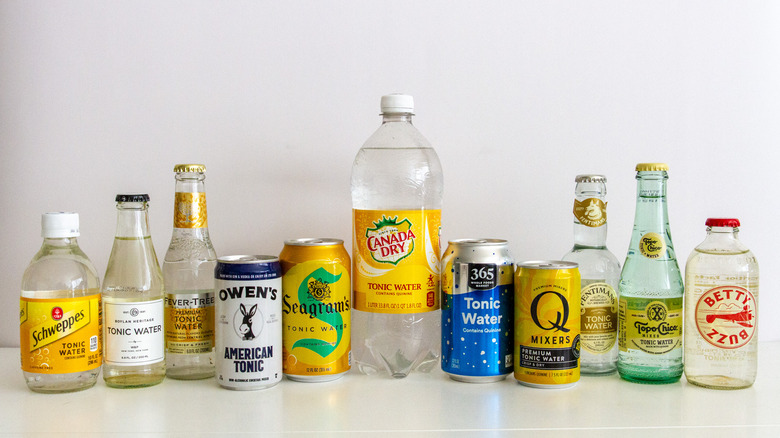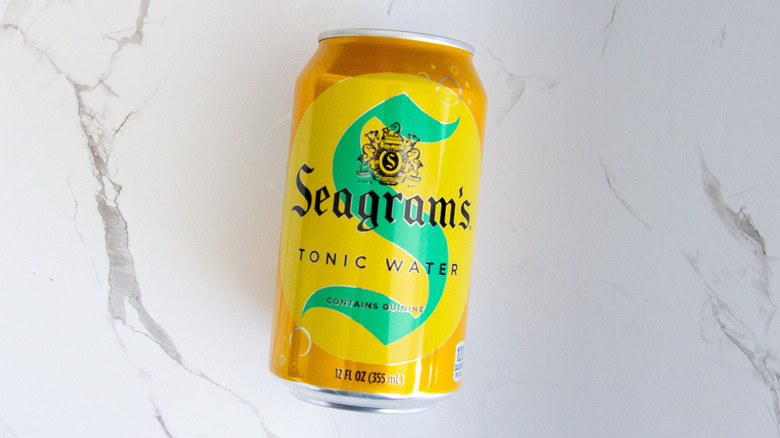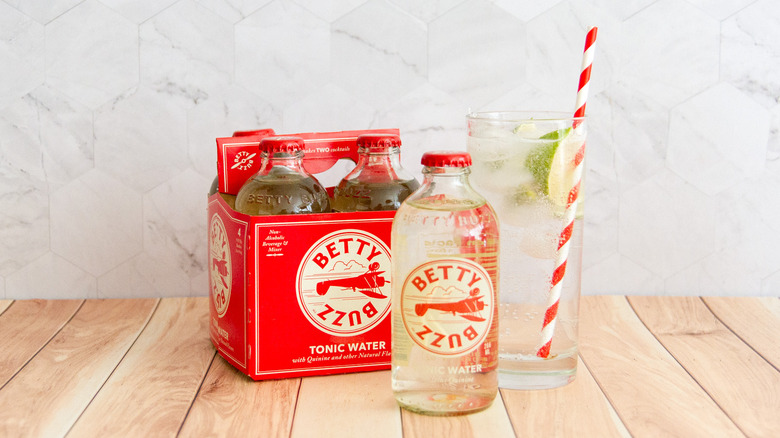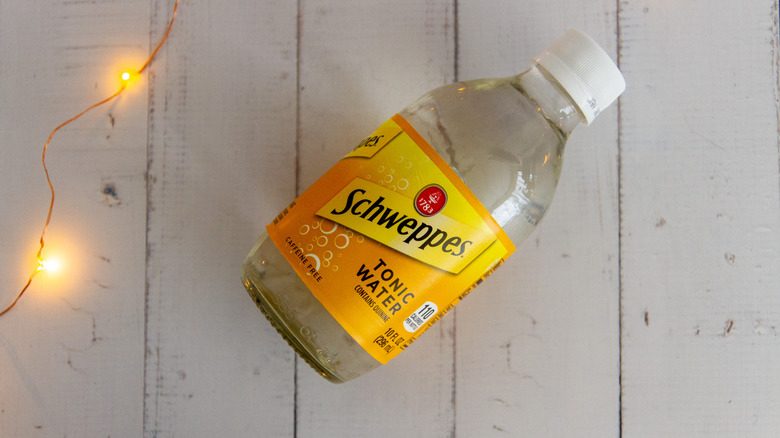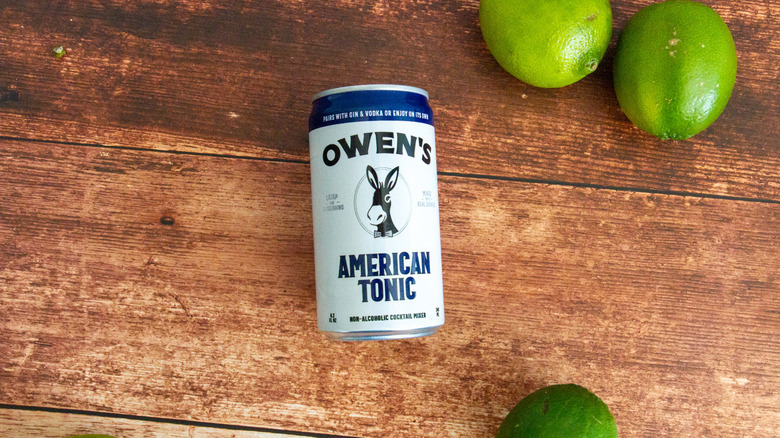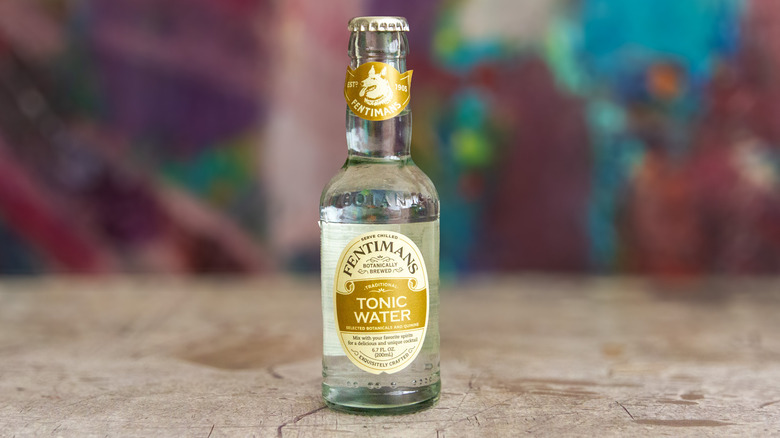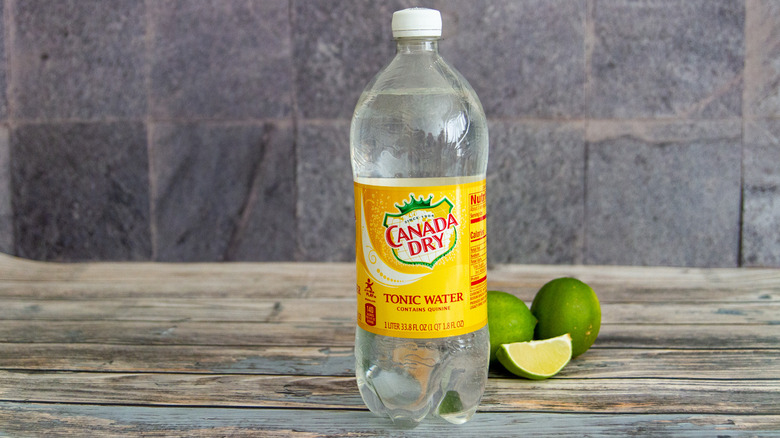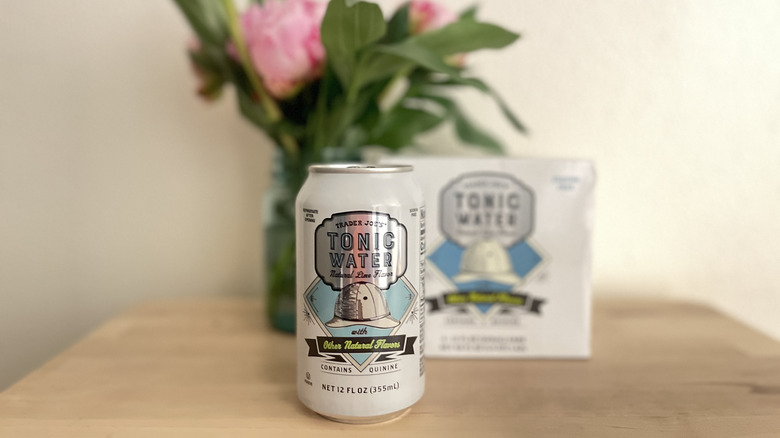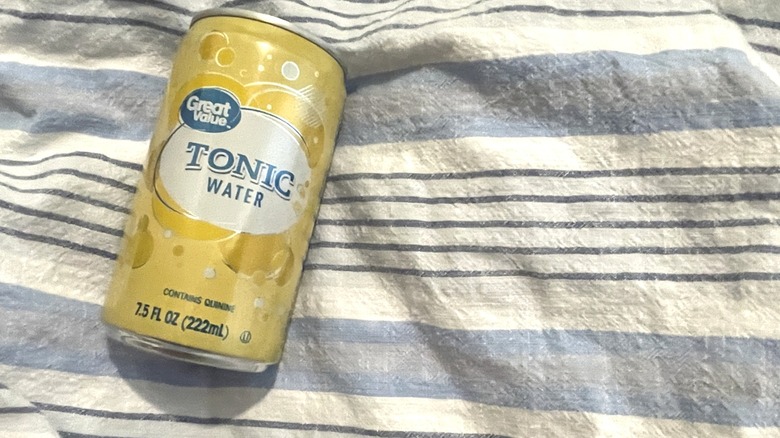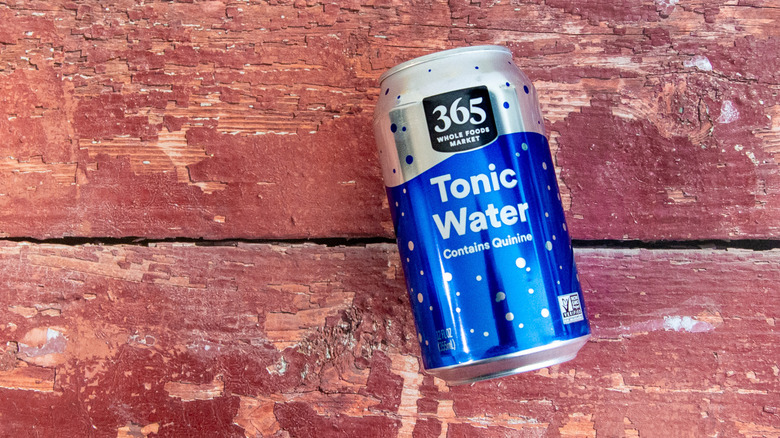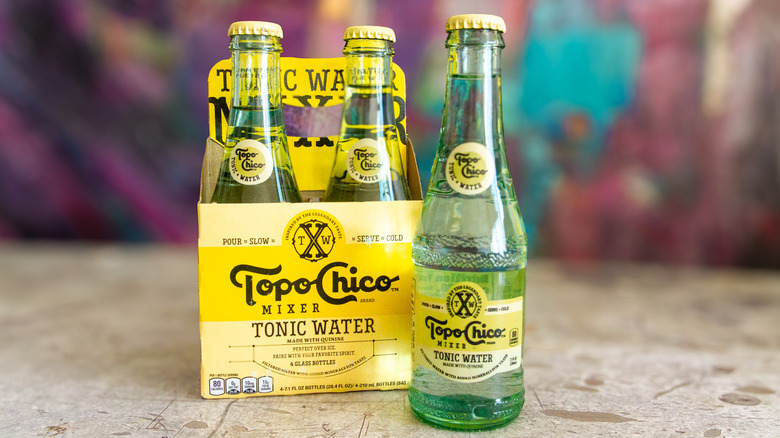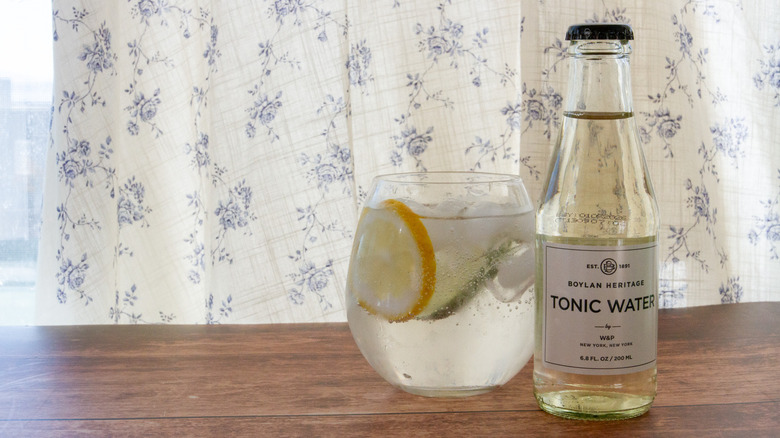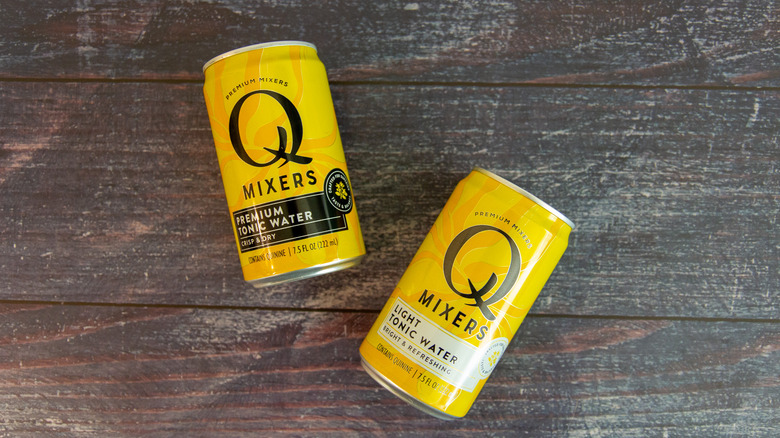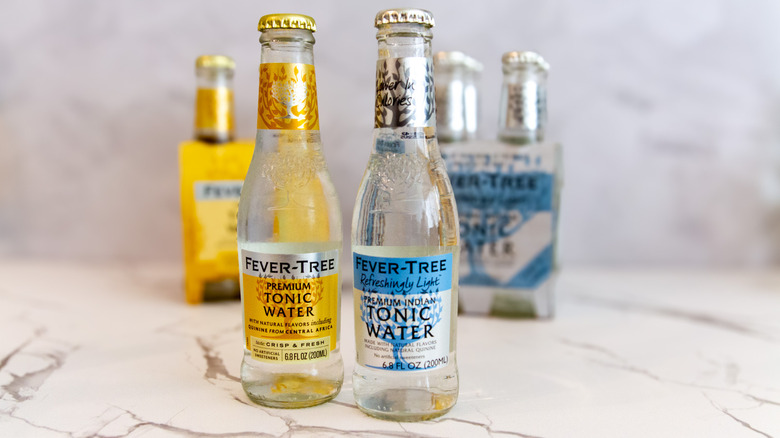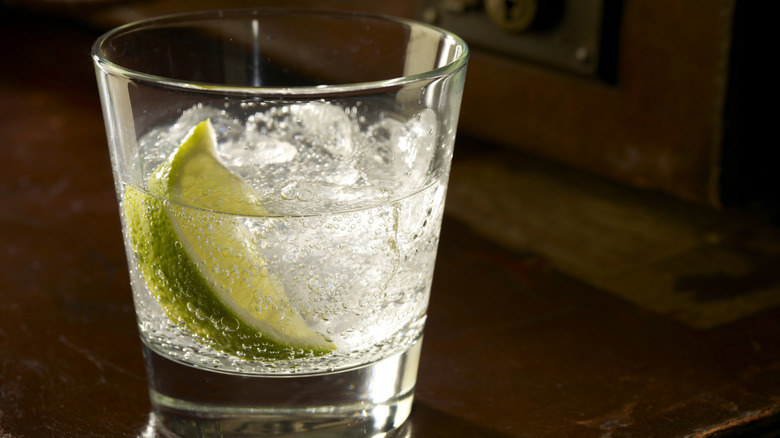13 Tonic Water Brands, Ranked Worst To Best
We may receive a commission on purchases made from links.
Tonic water has an interesting history; it was originally produced as a malaria preventative. That quintessential bitter flavor of tonic water comes from quinine, a substance found in Cinchona bark. It was believed to have been a cure for fever as early as the 17th century. What was used as medicine has become a bar essential today. The best tonic waters are indispensable tools in a bartender's lineup because of their ability to transform a shot of vodka into a refined cocktail or add depth to a more complicated beverage. I wanted to find the best tonic water brand for all purposes, be it for a classic G&T or as a base for another tasty beverage.
A good tonic water should have plenty of long-lasting carbonation and a bright flavor profile that delicately balances sweetness with the bitterness of the quinine. Other ingredients — when present — should not overpower the quinine flavor, but enhance it. It should be aromatic, refreshing and crisp, and pleasant to drink on its own or mixed with spirits including vodka or gin. I chose to make a gin and tonic with each of these products to evaluate how the unique flavor of the tonic water would contrast the herbal subtleties of the gin and create a cocktail that really sings.
Some recommendations are based on firsthand impressions of promotional materials and products provided by the manufacturer.
13. Seagram's
Seagram's tonic isn't bad; it's just not amazing. It has several drawbacks that earn it the lowest spot on the list. First, the flavor is mediocre. It doesn't have a strong quinine taste or any aromatics to bring out the subtleties of the gin, nor to help it stand alone as a beverage in its own right. The bitterness of the quinine is one dimensional and unimpressive. It's also only available in cans, a packaging choice that can make it taste different than the product inside of a bottle.
It's sweetened with high fructose corn syrup, with a 12-ounce can clocking in at a whopping 20 grams of sugar per serving. Furthermore, it's difficult to locate this tonic on store shelves, and it's not as widely-available as the other options on this list. Lastly, it's not even a good bargain, since it's priced nearly as high as premium brand Fever-Tree.
Seagram's tonic water makes a lovely ginger ale and is the classic go-to whiskey for a seven and seven cocktail. But unfortunately, it's not the brand's strongest product.
12. Betty Buzz
Betty Buzz is a woman-owned company that makes a line of zero-alcohol soda and mixers. The brand doesn't use artificial colors or flavors in any of its products, which makes it a popular choice for a mixer.
Betty Buzz gets definite points for style. It has cute, retro-inspired stubby bottles, vibrant red packaging, and a charming brand aesthetic. The tonic water itself has a lovely level of bubbles, but they do seem to fizzle out quickly. It's refreshing on its own, though suffers from being a tad boring. The flavor profile has only the lightest essence of quinine, so it comes across a bit weak. For those who truly enjoy tonic and the bitter herbaceous quality of quinine, Betty Buzz's light flavor leaves something to be desired. It's also one of the most expensive options in this ranking. And for a premium price, one would expect a little more.
11. Schweppes
Schweppes started in England in 1783 and has been making tonic water since the 1870s. Its status as a well-known, historic brand boosts its credentials amongst tonic water competitors.
Although it has roots in England, it's owned by Coca-Cola today. As a result, it's widely available and very affordable. It's also made in huge quantities with high fructose corn syrup and has a somewhat bland, citrusy flavor designed for mass appeal.
It is delightfully bubbly, though, and the sour lime flavor makes you want to gulp it down rather quickly. It doesn't make a great beverage on its own, but when mixed into a cocktail, it works decently well. It's lacking a little depth and unfortunately, it's not as wildly interesting as some of the other top brands on this list. Schweppes doesn't surprise and delight drinkers, but it's a decent choice for your gin and tonic, which earns it a spot near, but not on, the bottom.
10. Owen's Mixers
Owen's Mixers is a family-owned business and relative newcomer to the world of tonic water. It was established in 2016 by two brothers-in-law. Owen's Mixers uses cane sugar instead of corn syrup in its products, and also opts for real juice in its flavored mixers. Although the company is young, it's made a splash in cocktail culture and has expanded rapidly. Owen's Mixers are now available at large chains, such as BevMo! and Walmart and throughout the U.S.
Owen's Mixers American Tonic has a sweet lemon-lime scent, vigorous bubbles, and a light and airy quinine flavor. It's on the sweeter end of the tonic water spectrum, with less herbal complexity than Fentimans but a richer flavor profile than Schweppes — partly due to its use of cane sugar. It comes in convenient 8.2-ounce cans, which maintain carbonation perfectly for individual servings. It falls about average for cost, making it neither a splurge nor a bargain. It holds its own in terms of availability, cost, ingredients, and flavor, making it a great all-around tonic water that balances everything quite nicely.
9. Fentimans
Fentimans is another English company that has been brewing non-alcoholic beverages only since 1905. Remarkably, the brand is still owned by the original Fentiman family — no corporate consolidation here. Fentimans focuses on botanical brewing, and the ingredient list for its tonic water boasts an impressive array of infusions and fermentations, including makrut lime, lemongrass, and juniper berries.
The intricate interplay of these ingredients imparts a light, bright, and almost lemony flavor. It's not too sweet and has a light hit of bitterness just at the finish. The quinine doesn't hit you over the head, but it's definitely present. It's complex and interesting, but not very satisfying on its own. Rather, where Fentimans tonic truly shines is in a gin and tonic. Once mixed with gin, the tonic's unique character shines, while still allowing the quality of the gin to unfold. It enhances, rather than covers, the complex aromatics present in a quality gin. Fentimans even has a pairing guide on its website to help you match your favorite gin with its ideal botanical brew counterpart.
Since it's made by a small English company, Fentimans' tonic water is a bit harder to source worldwide and is therefore pricier than other options, at least outside of the U.K. It's quite good, but it's difficult to justify the expense and effort required to locate it.
8. Canada Dry
Canada Dry is perhaps best known for its ginger ale, but its tonic water is arguably almost as popular. It's widely available at grocery stores nationwide, where it's sold in 7.5-ounce cans or a large 1-liter plastic bottle for multiple servings.
Despite the less-than-ideal plastic packaging, Canada Dry's tonic water has almost explosive levels of fizz that last long after you pop the top. It initially smells like lemon-lime soda; it's very sweet with a strong citrus aroma. It's not as sweet once you taste it, but still one of the sweeter options out there, courtesy of a pretty large amount of corn syrup. While it's not as dry or as flavorful as a lot of the other tonic water choices, it avoids crossing the line into sugary sweetness. Canada Dry one of the most affordable tonic waters on the market, which makes it a standout among bargain options. It's an easy drinking, no-fuss tonic water great for everyday enjoyment.
7. Trader Joe's
Trader Joe's tonic water is delightfully effervescent with strong carbonation, but sadly the carbonation dissipates quickly. The quinine is well balanced, perceptible but not overpowering, and in beautiful proportion to the sweetness. It also has natural lime flavor added, which has benefits and drawbacks. It creates a handy shortcut for mixing up tonic-based cocktails, since a great many of them incorporate a twist of lime. However, the additional lime flavoring also limits the versatility of Trader Joe's tonic water. Furthermore, even though it includes natural lime flavor, it's still not quite as bright and zingy as freshly squeezed lime juice, making it a convenient but ultimately inferior substitute for real lime juice.
It's sweetened with natural cane sugar rather than corn syrup, and comes in at a middle-of-the-road 90 calories per 12-ounce aluminum can. It's affordable and widely available at any of Trader Joe's 600-plus locations nationwide, though it is a Trader Joe's exclusive. Its convenience, natural ingredients, and affordability earns it a spot solidly in the middle of the pack at number six.
6. Great Value
Next in the ranking comes a product not from a beverage brand at all, but rather from retail giant: Walmart. Its store brand, Great Value, offers tonic water in 1-liter plastic bottles, or petite, 7.5-ounce aluminum cans. The mini cans are a useful size for mixing individual drinks without losing carbonation, while the bottles are perfect for making batch drinks for a crowd. The convenience and versatility of the packaging earn it a few points, as does its affordability and availability at the more than 10,000 Walmart stores in 19 countries.
It has decent carbonation levels, though it's not especially long-lasting. The quinine offers strong bitter notes. Where Great Value tonic loses points is its flavor. It's one of the sweetest tonic waters that was sampled — likely due to the fact that one of the mini cans contains a whopping 21 grams of added sugar in the form of high-fructose corn syrup. That sweetness overpowers the quinine and requires a generous squeeze of lime to balance it out in a cocktail. Ultimately, other options are simply better tasting, and Great Value's convenience is not enough to outweigh its flavor.
5. 365 by Whole Foods
365 is the store-brand for Whole Foods Market, and its tonic lives up to the natural foods ideals that underpin Whole Foods' entire brand identity. This product is made with invert cane sugar rather than corn syrup and features a BPA-free liner on its cans. These are two elements that rank it slightly ahead of other mass-produced canned tonics.
365's tonic water is sweeter and less complex than the higher ranking tonic brands. The quinine and other flavorings are less prominent, so it's walking right up to the edge of being too sweet. It's just slightly less fizzy and a tiny bit less crisp than the other brands, but it's not bad at all. It's an excellent, low-cost option that's also widely available at any of Whole Foods' hundreds of grocery stores across the U.S. 365 outranks similarly-priced, widely available options due to its superior flavor, natural ingredients list, and care with packaging.
4. Topo Chico
Topo Chico tonic water has a strong quinine aroma and offers an equally bold taste of the bitter bark. Topo Chico is known for its mineral water, which has gained a cult following in recent year. The brand leverages that by adding minerals into its tonic water as well.
The additional minerals impart a difficult-to-define and somewhat resinous quality to this tonic water. If you like the forceful bubbles and crisp taste of Topo Chico mineral water, you're likely to enjoy the brand's take on tonic water as well. It's absolutely crystal clear, effervescent, and refreshing, which makes it equally as fantastic on its own as in a cocktail.
In a G&T, the mineral sharpness of the tonic water marries beautifully with gin's juniper aroma. It loses a few points only because while the taste is quite distinct, it's a less-traditional take on classic tonic water. Therefore, it has the potential to be divisive and potentially may not match every gin or vodka you choose to pair it with.
3. Boylan Heritage
Boylan Bottling is a heritage soda company that's been around since 1891, so it's safe to say they know a thing or two about craft soda. It makes its hand-crafted sodas with natural flavors and no artificial sweeteners.
Flavor-wise, this tonic water is citrus-forward with mild quinine, complemented by notes of lemon, key lime, and orange bitters. It tastes fresh and juicy without being sweet. The layered citrus flavors allow this tonic to easily stand on its own, or hold up beautifully in a gin and tonic. With its strong citrus profile, one might expect the standard G&T squeeze of lime to be too much. But I found it blends together with the gin and draws out the spirit without overpowering it.
This is a tonic water that's truly been taken to the next level. It ranks third only because it's by far the priciest option on the list; it costs two to three times more than any other tonic brand listed here. It can also be difficult to get your hands on it, since it's carried only at select retailers and is made in smaller batches than brands like Seagram's and Schweppes. But if you can find it, it's worth a little splurge; it will transform your gin and tonic into something truly special.
2. Q Mixers
Q Mixers' tonic water is spectacular indeed. It comes in cans or glass bottles, that pour over ice with big, voluminous bubbles that tickle your nose as you sip. It has a fairly neutral aroma, but the flavor is bold and crisp with a pleasant tang of sour citrus. It's dry and bitter, yet so crisp and quenching that encourages you to gulp it down.
It's refreshing all on is own, and it also makes a wonderful cocktail mixer. In a gin and tonic, the subtle aroma allows the alcohol's botanicals to come through strikingly well. It conveniently comes in mini 7.5-ounce cans and small 6.7-ounce glass bottles, or large 750-milliliter bottles for sharing. The container options are a thoughtful consideration that allows you to choose the bottle size that suits your needs.
The brand offers both the classic tonic water and a lighter version. Q Mixers' light tonic water clocks in at a minuscule 20 calories per can, courtesy of the low-calorie sweetener erythritol. Erythritol is certainly one of the less offensive-tasting artificial sweeteners, but those who are sensitive to sugar-free additives may find its inclusion off-putting. That is the only drawback to Q Mixers' tonic water, so it receives a well-deserved second place in this ranking.
1. Fever-Tree
Fever-Tree is renowned as a premium tonic option — and for good reason. Its premium tonic water is everything you expect from tonic — elevated to an exquisite level. It's light, refreshing, bubbly, and crisp with a strong — yet not overpowering — quinine bitterness balanced against a whisper of sweetness. A touch of bitter orange brings citrus notes to perfectly round out the aromatic complexity. Fever-Tree's tonic water is drinkable on its own, with a squeeze of lime, or inside of a gin and tonic. It comes in small glass bottles for convenient serving, which also helps preserve the carbonation and integrity of the flavor.
Most remarkable of all, Fever-Tree uses no artificial flavors or sweeteners, even in its Refreshingly Light tonic. It's frankly astonishing that the light version is nearly as good as its premium tonic water, even with about half the calories. It's so remarkable, it's almost hard to believe.
Fever-Tree's bright and sunny tonic water captures the essence of summer, but would feel perfectly at home in a cocktail or mocktail at any time of year. That makes it my top-ranked tonic water brand.
Methodology
I ranked these tonic waters based on effervescence and flavor, and took into account factors like sweetness, bitterness, and overall flavor balance. I sampled each one straight, and also mixed it into a standard gin and tonic recipe. When relevant, I also considered the price and availability of each product.
